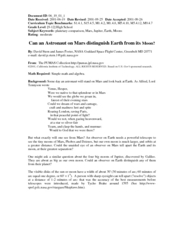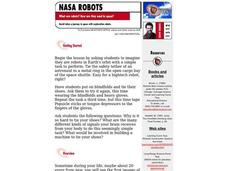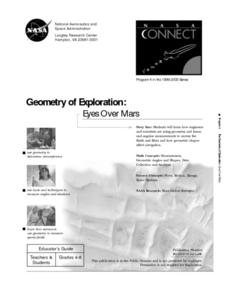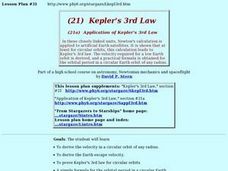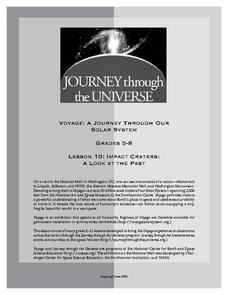Curated OER
Program Your Partner
Students explore the world of robotics. In this robotics lesson, students study the history of robots and work with partners to find out how hard it is to accurately guide robots through simple tasks.
Curated OER
MAPPING THE TOPOGRAPHY OF UNKNOWN SURFACES
Students describe in words and graphic displays the elevation or depression profile of sections of Mars' Olympus Mons and/or Valles Marineris. They explain how orbiting spacecraft build up global maps one data slice at a time.
Curated OER
Fostering Geospatial Thinking: Space to Earth: Earth to Space (SEES)
High schoolers locate and access data to help them with their science inquiry. In this geographical positioning lesson students evaluate and compare data sets.
Curated OER
Can an Astronaut on Mars Distinguish Earth from its Moon?
High schoolers explore the possibility of being on Mars and being able to identify the Earth. In this space lesson plan students complete a set of calculations to see if this is possible.
Curated OER
Determining the Altitude of Iridium Flares
Students examine what iridium flares are and when they occur. In this iridium flare lesson students complete an activity to see how far overhead Iridium satellites are.
Curated OER
Impact Craters: Holes in the Ground!
Middle schoolers simulate crater formation through a lab activity. In this space science lesson, students calculate how much energy is transferred during meteorite impact. They identify different factors affecting the size and depth of...
Curated OER
Rover Races
Students identify the challenges encountered by astronauts in operating a planetary rover. In this space science lesson plan, students create a rover using their team members. They follow a command sequence from the driver and navigate...
Curated OER
FOLLOW THAT WATER
Students build simple stream tables and vary the angle of the stream tables in order to simulate different flow rates and compare the results. They observe various features formed in a stream table by flowing water and compare these to...
Curated OER
Rocket Transportation
Students use problem solving skills to lift a load using a balloon rocket. They construct a rocket out of a balloon and use it to carry a paper clip payload.
Curated OER
Time Zones
For this time zones worksheet, students are given a map of the Earth indicating the time zones, the prime meridian and the international date line. Students answer 5 questions about solar occurrences and determine when each would be seen...
Curated OER
Follow the Falling Meteorite
Students use triangulation method to locate meteorite landing site on the map. In this earth science lesson, students participate in a meteorite treasure hunt set up by the teacher. They explain how this method is used by scientists to...
Curated OER
Sky Time: On the Astronomical Meaning of the Day, Year and Seasons
Learners simulate the movement of the Earth using their body motion. In this earth science instructional activity, students explain how this causes seasonal changes on Earth.
Curated OER
Robots
Students play the parts of robots and their controllers. In this robot lesson plan, students learn about robots, and use verbal commands to simulate how a robot would command to it's controller.
Curated OER
Impact Craters
Students investigate the factors affecting the size of a crater. In this space science lesson, students collect data from the activity and graph them. They explain how velocity of impact relate to crater size.
Curated OER
Seeing Interference Fringes with a Telescope
Students construct an interferometer using a simple telescope. In this physics instructional activity, students explain how light waves create the fringe patterns. They observe patterns made by different objects in the sky and compare them.
Curated OER
Geometry of Exploration: Eyes Over Mars
Students research how engineers and scientists generate linear and angular measurements with geometry to survey the Earth and Mars. They assess how geometric shapes affect navigation. A surveyor comes to the classroom and explains how he...
Curated OER
Momentum
Students learn the concepts of momentum and its conservation, using the recoil of a cannon as an example. They examine how momentum is a vector, allowing its conservation to be applied to problems in 2 and 3 dimensions.
Curated OER
Mud Splat Craters
Students simulate crater formation using mud. In this earth science lesson, students identify the features of a crater. They explain how the force of impact affect the crater's appearance.
Curated OER
Kepler's 3rd Law
Learners derive the velocity in a circular orbit of any radius. They derive the Earth escape velocity and prove Kepler's 3rd law for circular orbits # A simple formula for the orbital period in a circular Earth orbit of given radius.
NASA
Soda Straw Rockets
Three, two, one, blast off to a better understanding of force and motion with this exciting science instructional activity! Beginning with a discussion about rockets and gravity, young scientists go on to complete a series of worksheets...
Curated OER
Worksheet 19: Ship Positions
In this math worksheet, learners read informational paragraphs and then answer 18 questions using data from their readings. Questions are about vectors, positions, distance and orbits.
California Academy of Science
Kinesthetic Astronomy: The Meaning of a Year
How many times have you traveled around the sun? Aspiring astronomers grasp what a year is and they differentiate between orbit and rotation by walking around the sun right within your classroom. Place a lamp in the center of the room to...
Journey Through the Universe
Impact Craters: A Look at the Past
The Galle crater on Mars is also known as the Happy Face crater because of its appearance. First, scholars use pebbles and flour to simulate craters and study their properties. They then apply this knowledge to help decipher the history...
Messenger Education
Mission: Possible—How Can We Plan an Exploration of Another World?
An astronaut's spacesuit weighs 280 pounds and takes 45 minutes to put on — that's a serious suit! The second activity of a three-part series allows pupils to see all that goes into space exploration. Through simulations, groups analyze...





